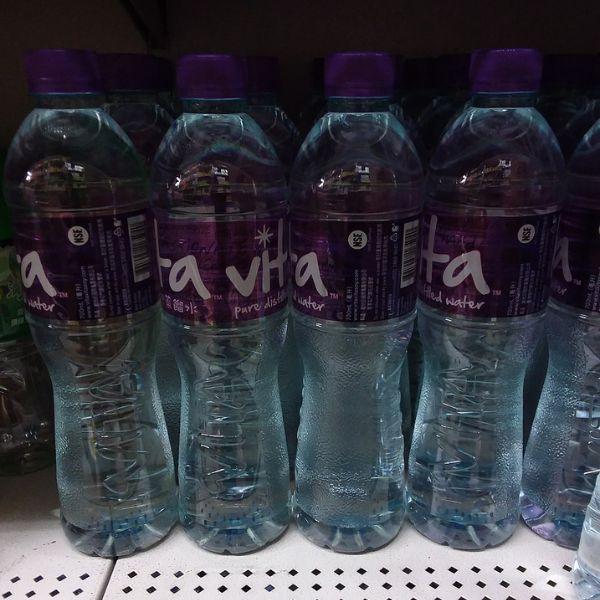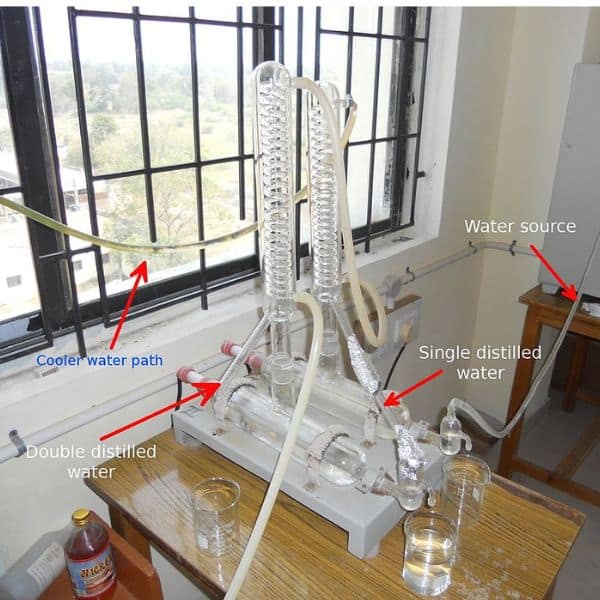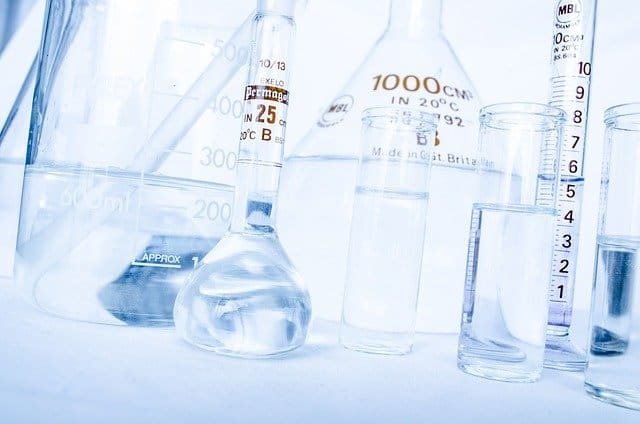What is Distilled Water?
Distilled water is a type of purified water that has undergone distillation. During this process, impurities and minerals are removed from the water by boiling it and then collecting the steam as it condenses into a separate container. The result is pure H2O without any dissolved solids or minerals.
Distilled filtered water is commonly used in medical settings, such as for sterilizing equipment or in dialysis machines. It can also be used in laboratory experiments where pure water is necessary to prevent the contamination of samples. Additionally, some industries use distilled water in their manufacturing processes to ensure product quality and consistency. Here is a list of the top water distillers that you might be interested to look over.
Despite its benefits, there are some concerns about the health effects of drinking distilled water regularly due to its lack of minerals essential for human health. However, most people get enough minerals from their diet, so occasional consumption of distilled water should not pose any significant health risks.

Is Distilled Water Safe to Drink?
Distilled water has been gaining popularity among health enthusiasts in recent years. However, the safety of drinking distilled water is still debated among experts. Distillation is a process that involves boiling water and then condensing the steam back into liquid form, thus removing impurities and minerals.
One concern about distilled water is that it lacks essential minerals such as calcium and magnesium, which are important for maintaining good health. Some studies have suggested that long-term consumption of demineralized water may increase the risk of mineral deficiencies and related health problems. However, these claims remain controversial as many people obtain these nutrients from other sources, such as food or supplements.
Another potential issue with distilled water is that it may become acidic due to its lack of buffering minerals. This acidity can cause corrosion in pipes or appliances if used for cooking or cleaning.
Distilled water is available from the grocery store in the form of distilled water or bottled drinking water. It can also be produced at home with a simple distillation process. Distilling involves boiling water and then collecting only the steam through condensation. The Environmental Protection Agency (EPA) also urges people to rely on water distillers or water filters rather than using bottled water which causes environmental pollution.
What Does a Water Distiller Remove?
A water distiller is a device that purify water by boiling it and collecting the steam, which is then condensed back into liquid form. This process removes impurities such as minerals, chemicals, and other contaminants from the water. But what exactly does a water distiller remove?
A water distiller removes total dissolved solids such as calcium and magnesium which can contribute to hard water buildup. These minerals are important for our bodies but can be harmful when consumed in excess amounts or inorganic form. Distilled water also eliminates organic contaminants such as bacteria, viruses, protozoa, algae, and fungi that may be present in tap or well-water sources.
Additionally, due to industrial pollution or agricultural runoff, volatile organic compounds (VOCs) such as benzene and trihalomethanes (THMs) are often found in drinking water (VOCs). These compounds can harm your health, and distillation will remove them.

What Are the Potential Benefits of Drinking Distilled Water?
Drinking distilled water has been a topic of interest for many years, with some people advocating for its benefits while others remain skeptical. However, despite the controversy surrounding this type of water, several potential benefits can be derived from drinking it.
Health benefits
One major benefit of drinking distilled water is that it is free from impurities and contaminants such as bacteria, viruses, chemicals, and minerals. This makes it an excellent choice for individuals with weakened immune systems or is sensitive to certain chemicals in tap or bottled water.
Drinking distilled water also improves digestion. Since distilled water is free from minerals, toxins, and other impurities, it can help flush out harmful substances from the digestive system. This can lead to improved bowel movements, reduced gas and bloating, and better absorption of nutrients from food.
Furthermore, since distilled water is stripped of minerals through the distillation process, it can help in reducing the intake of certain minerals that may be harmful when consumed in excess.
Hydration levels
Hydration is an essential process that helps maintain optimal body functions. With its unique purity and mineral-free profile, distilled water is the perfect hydration solution for many people. It offers numerous benefits to the body that surpass regular tap water.
Hydration levels in distilled water improve digestion. Drinking distilled water helps eliminate toxins from the digestive system, enabling smoother digestion and nutrient absorption. Additionally, it enhances metabolism by increasing the rate at which food is broken down in the stomach.
Skin health
Another benefit of drinking distilled water for skin health is its ability to hydrate and moisturize the skin. Because distilled water lacks impurities and minerals in tap or bottled water, it can easily penetrate the skin cells without leaving any residue or buildup. This makes it an excellent choice for individuals with dry or sensitive skin who may be more prone to irritation from harsh chemicals or mineral-rich waters.
Moreover, drinking distilled water may also help flush out toxins from the body that can contribute to skin issues such as acne and inflammation.
A natural detoxifier
Distilled water also can remove toxins from the body. Because it lacks minerals and other substances in tap or bottled waters, distilled water can help flush out harmful chemicals from our systems more effectively. It acts as a natural detoxifier by binding with toxins in our bodies and carrying them out through urine or sweat.

What Are the Risks of Drinking Distilled Water?
Drinking distilled water has been debated among health enthusiasts and medical professionals. While some believe it to be a healthy choice due to its purity, others argue it can pose serious health risks.
Distilled water is created through a process that involves boiling water and collecting the steam as it condenses. This process removes impurities such as minerals, bacteria, and other contaminants from the water. However, this also means that important minerals like calcium and magnesium are removed from the water during distillation.
Water without these healthy minerals can lead to mineral deficiencies in your body. Since all minerals present in natural water are removed during the distillation process, you won’t get any essential minerals like calcium, magnesium, or potassium from drinking distilled water alone. This non mineral water can harm your health over time as minerals play vital roles in various bodily functions such as nerve function, bone health, and heart function. That’s why homeowners should compare water filter (reverse osmosis filter or UV filter) with a water distiller before investing in one.
Common Uses of Distilled Water
As mentioned above, distilled water is purified water that has gone through a distillation process to remove impurities and minerals. This makes it ideal for various applications where purity is crucial, such as laboratories or medical facilities. Here are some common uses of distilled water:
Medical Procedures
Distilled water is used in medical facilities for various purposes, such as cleaning equipment, diluting medications, and preparing solutions for injections. It is also commonly used during surgeries to prevent the risk of infection.
Distilled water can also be used as a wound-cleaning agent because it contains no harmful contaminants or bacteria that could cause infections.
Laboratory Experiments
In scientific experiments, accuracy and precision are essential components that contaminated materials cannot compromise. That’s why distilled water is widely used in laboratory experiments to ensure that the results are reliable and free from interference.
Industrial Applications
Industries that use large quantities of water, such as breweries, food processing plants, and textile manufacturers, commonly use distilled water to ensure that their products are free from contamination.
Household Applications
Distilled water supply is commonly used in households by people who want to make soft drinks, mix baby formula, or even use it in the bathroom as a hand-washing solution.
Automotive Maintenance
Another popular use for distilled water is in automotive maintenance. It’s an excellent choice for topping off car batteries because it doesn’t contain minerals like tap water does, which can cause corrosion on the battery terminals over time.

Purified Water Vs. Distilled Water: What is the Difference
Purified and distilled water are different types of purified water that have undergone different processes to remove impurities.
Purified water typically taps water that has gone through a filtration process to remove any contaminants, such as bacteria, viruses, and chemicals. Distilled water, on the other hand, goes through a more intensive purification process that involves boiling the water and then collecting the steam as it condenses, leaving behind any minerals or impurities.
One of the main differences between purified and distilled waters is their mineral content. While purified water may still contain trace amounts of calcium and magnesium, distilled water has been completely stripped of all minerals during the distillation process. This can make distilled water taste flat or bland compared to purified waters with some mineral content.
Another difference between these two types of purified water is their intended use. Distilled water is often used in laboratory settings and for cooking and making coffee. This type of water is also very popular in commercial food preparation. Purified water is often used as drinking water and is a popular alternative to spring or mineral waters. It is also recommended for people who are on low-sodium diets.
Things to Consider Before Drinking Distilled Water
Distilled water is a popular choice for people who want to ensure they drink clean and pure water. However, before making the switch to distilled water, there are a few things that you should consider. Here are some important factors to keep in mind before drinking distilled water.
It’s important to note that distilled water does not contain any minerals or nutrients present in other drinking water types. If you rely solely on distilled water for daily hydration, you may miss out on essential minerals such as calcium and magnesium. Experts suggest incorporating mineral-rich foods into your diet or supplements to combat this issue.
Another factor to consider is the pH level of distilled water. Distilled water has a pH level of around 7, which makes it neutral on the acidity scale. This means it is less acidic than other types of drinking water, such as spring water. A neutral pH level is great for health, but it may not be the best option if you have certain medical conditions or take certain medications.
Conclusion
Distilled water is a great choice for those looking to avoid contaminants in their drinking water. It offers the benefits of being free of chemicals and minerals, making it safe for people with certain health conditions. However, there are some drawbacks to using distilled water, such as removing minerals like calcium and magnesium. This can lead to mineral deficiencies in your body. Ultimately, it is important to weigh the advantages and disadvantages before deciding whether or not distilled water is right for you.

